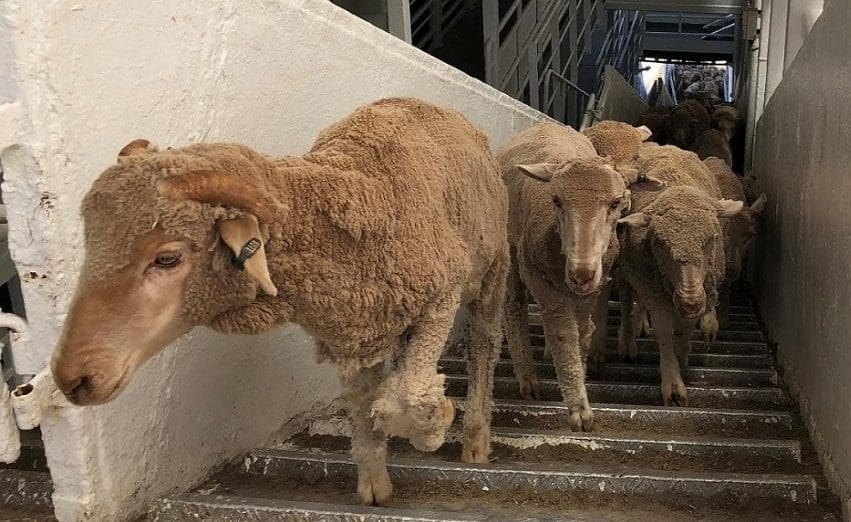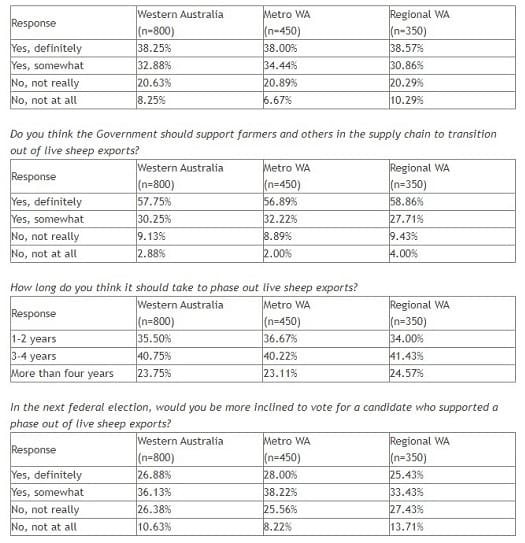
SHEEP Producers Australia has recommended the Federal Government undertake independent community sentiment studies on the live export trade phaseout as seemingly conflicting surveys are released about how people feel about the trade.
In its submission to the independent live sheep phaseout panel, SPA has called for the Federal Government to undertake independent economic and community sentiment studies that “provide unbiased and robust analysis about the trade’s performance and consequences of policy reforms for Australian sheep producers.”
The peak sheep meat body has also called the Federal Government to immediately reverse its policy decision to phase out sheep live export by sea and do independent expert analysis on farmgate competition forces in the WA sheep industry to avoid “perverse competition outcomes” from the phaseout. The SPA has called for a Federal Government commitment to a policy process that is evidence based, strategic, inclusive and collaborative, to ensure genuine consultation and engagement on future pathways for the Australian sheep industry.
Earlier this month Livecorp released 2019-2023 survey results from CSIRO spin-off Voconiq that showed a growing community confidence in the livestock export industry, including its animal welfare standards.
This contrasted with independent polling done for the RSPCA in May 2023 that found 71p percent of Western Australians surveyed supported the Federal Government’s policy to phase out live sheep export by sea. This included 72pc of people surveyed in WA metropolitan areas, and 69pc in rural and regional areas.
The polling also found almost 9 in 10 West Australians across the board agreed government should support farmers and others in the supply chain to transition out of live sheep exports, the RSPCA said.
Livecorp survey shows ‘growing community confidence’
Voconiq chief executive officer Dr Kieren Moffat said the Livecorp research program represents the largest, most authoritative and comprehensive dataset on Australian attitudes toward the livestock export industry. More than 4000 Australians were surveyed each time. The full Voconiq report is available here.
Dr Moffat said the Voconiq research is conducted in line with the National Statement on Ethical Conduct in Human Research, that includes being open and transparent about who is funding the research, the purpose of the project and how data will be used and stored.
“These are qualities that are often absent from other research in this area.”
Dr Moffat said Voconiqu examined a broad set of components in the supply chain, from sourcing the animals, through the voyage overseas, to their treatment in destination markets.
“The 2023 survey once again shows the community strongly values the role of live exports in regional communities, its contribution to the Australian economy, and the important market it provides for livestock farmers,” Dr Moffat said.
“There’s recognition of the benefits of the industry to people overseas, for health and cultural reasons, the transfer of know-how, and breeding stock to increase food security.
“Recognition of the industry’s contribution to improved diet and nutrition, for instance, has increased substantially since 2019.”
Dr Moffat said Australians remain concerned about animal welfare in the live export industry, but there has been a significant improvement in responses since 2019.
“There’s strong understanding that welfare is a complex issue and participants’ views reflect growing awareness of the work of the industry to improve welfare outcomes and treatment in overseas destinations.”
A series of questions was added in 2023 to explore any differences in sentiment toward the live sheep export industry specifically, compared to the industry overall.
“We asked the same questions both ways, in separate parts of the survey, and there was no significant difference in the results.
“For instance, when asked about costs versus benefits, 36 percent of participants said benefits outweighed the costs in both instances, and the costs and benefits were about equal for 37pc and 38pc of participants respectively.”
LiveCorp CEO Wayne Collier said it is pleasing to see that the industry’s efforts since the first survey appear to be having an effect.
“However, we know more needs to be done and we will continue to work in areas of concern to the community.”
Live export lobbyists ‘push polling’ – RSPCA
The RSPCA has said its surveys were conducted by independent, third-party polling companies like McCrindle Research who survey a nationally representative sample. The RSPCA doesn’t have any part in selecting participants and the polls are also not branded as ‘RSPCA’ surveys.
RSPCA Australia CEO Richard Mussell said it is disappointing, but not surprising, “to see more push polling from live export lobbyists.”
“What we know – from asking objective, balanced questions over many years – is 76pc of Australians are concerned about live animal export (2018).
The RSPCA said 78pc of Australians surveyed, if affected farmers were provided assistance to transition, would support a phase out of live sheep export – including 79pc of West Australians (2022)
 The 2022 survey found 67pc of Australian surveyed support ending live animal exports – including 70pc of West Australians.
The 2022 survey found 67pc of Australian surveyed support ending live animal exports – including 70pc of West Australians.
Mr Mussell said the results were consistent with past independent polling on live export undertaken over many years.
“These results prove that, even in the very historical heartland of live sheep export, the vast majority of Australians are ready to see this cruel practice end.”
“The independent poll asked a simple and straightforward question – ‘do you support the Government’s policy to phase-out live sheep export?” he said.
“The question was clear – and so was the overwhelming response from the community.
“The results from rural and regional Western Australians are particularly reassuring, as they confirm what we’ve always known – that the majority of people in rural and regional Western Australia also firmly believe Australian sheep deserve better than live export,” he said.
“It’s a sign that the extended campaign we’ve seen from live sheep export lobbyists has failed to even slightly shift the dial on Australia’s contempt for this unnecessary practice.
“These figures reaffirm the phase-out is a popular and much-welcomed policy decision by the Federal Government, and – when considered together with the irrefutable animal welfare science which consistently shows that this trade is inherently cruel – should spur the government to move forward with legislation as soon as possible, and setting the end date during the current term of Parliament.”
Mr Mussell also said the demise of live sheep export made it clear the public cannot and will not stand for the wool being pulled over their eyes, after years of clear evidence of the inherently cruel nature of this industry.
Consultation period inadequate – SPA
SPA said the Federal Government’s decision to recommit to its policy to phase out live sheep export by sea will remove a critical demand for WA sheep, thereby reducing farmgate competition and threatening the very livelihoods of the families, businesses and communities reliant on the WA sheep supply chain.
“Specifically, the devastation associated with this decision will be endured by the families and communities living in the Central Eastern Wheatbelt, Wheatbelt South, Great Southern and Upper Great Southern regions of WA.
“This decision also risks the enviable trading reputation that the Australian sheep industry has built with global customers over decades,” SPA said.
The SPA said the phaseout threatens the long-term viability of the WA industry, will destroy Australian businesses and jobs, endanger trading partners’ ongoing food security and sets an alarming precedent for future agricultural policy decision making.
SPA said period assigned for phaseout consultation meant it is impossible for industry, those opposed to the trade, or government to undertake the data collection and analysis required to inform a robust position about the requirements for a transition away from the trade.
Click here to read the full SPA submission.



In regard to the above article, LiveCorp categorically refutes the false statements and criticism of the validity of its research into community sentiment regarding the live export industry, and the label of ‘live export lobbyists’.
Such comments from RSPCA are a slight on LiveCorp and Voconiq, the independent company that carries out the research. LiveCorp is a rural research and development corporation and is not allowed to operate in the agri-political space. It takes that very seriously. It objects in the strongest terms to accusations made by RSPCA and asks that they be redacted.
LiveCorp’s role is to provide objective and factual information to industry and stakeholders, and commissioned this project in 2019. Voconiq produces a comprehensive public report after each national survey – all of which are publicly released with details transparently shared of the methodology. As the article identifies, the most recent report summarised the third national survey of around 4,500 Australians, providing an analysis of trends over time.
Participants are recruited from an online panel, agreeing to the survey before knowing the topic. They are then provided information about who is funding the work and how the data’s going to be used – a key tenant of ethical research practice.
LiveCorp stands by the independence of the approach used by Voconiq and the results it has delivered.
The report Live exports and the Australian community 2019-2023 is available on LiveCorp’s website: https://livecorp.com.au/report/3t42rgz0OfFfRxzddT6SVl